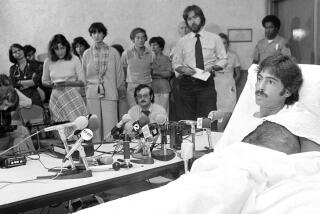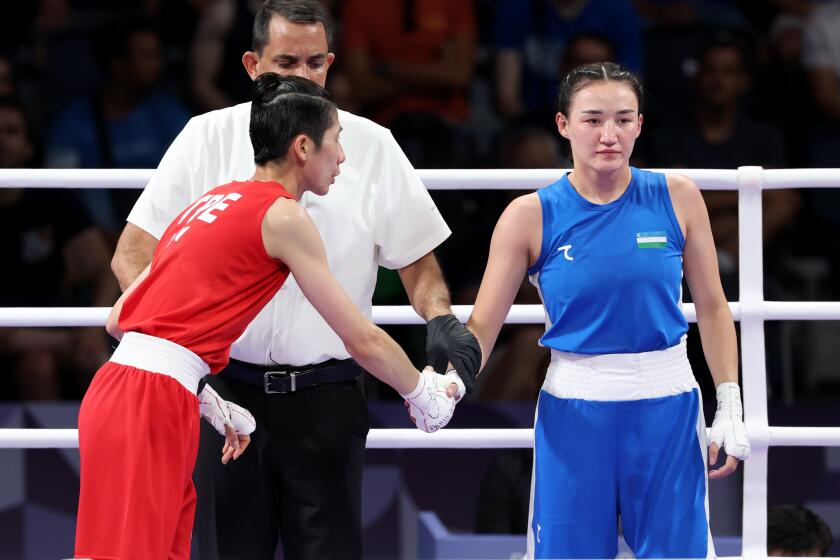19 YEARS LATER : Liston Death Remains Mystery to His Friends
LAS VEGAS — When it happened, more than 19 years ago, it was a shock. And, in a way, it’s still a shock.
Sonny Liston dead? How could it be?
For the record:
12:00 a.m. Feb. 23, 1989 For the Record
Los Angeles Times Thursday February 23, 1989 Home Edition Sports Part 3 Page 4 Column 4 Sports Desk 1 inches; 17 words Type of Material: Correction
The date of Sonny Liston’s death was reported erroneously in Wednesday’s editions of The Times. Liston died Dec. 30, 1970.
He was a mountain, a guy who had muscles in his ears. He had a left hook that could take down buildings. Before his two questionable performances against Cassius Clay-Muhammad Ali, he was generally perceived as indestructible.
After he had knocked out Floyd Patterson twice, both times in the first round, it didn’t appear that there was a human on the planet who could stand up to him.
He was to boxing in the early 1960s what Mike Tyson is today.
Then came the fights with Cassius Clay, who changed his name to Muhammad Ali after the first of them.
In the first one, which occurred in Miami 25 years ago Saturday, Liston surrendered the title while sitting on his stool, claiming an injured shoulder. In the rematch at Lewiston, Me., Liston went down from a first-round punch that didn’t look strong enough to break an egg.
It’s still a much-discussed fight, and if there are any never-told secrets connected with it, they went with Liston to his grave here.
Although Liston-Ali II finished Liston as a big-money fighter, he continued to fight lesser names in the heavyweight division.
Then, in the first week of January, 1970, Liston’s wife, Geraldine, returned home from a trip and found Liston’s decomposing body on their bed, on his back, clad only in shorts and socks. There was blood on his face and chest, and a small glass of vodka on the nightstand.
The milk bottles and newspapers on the front porch indicated to police that he had been dead five or six days. Since the death certificate required a date, it was fixed at Dec. 30.
Police reported finding a small amount of marijuana in a pants pocket and a quarter-ounce of heroin in a balloon in the kitchen. On his bedroom dresser was a loaded .38 revolver. Later, the coroner reported finding needle marks in Liston’s arm.
Circumstantial evidence suggested an overdose. The probable cause of death on the autopsy report was listed as heart failure.
To his friends, the death of Sonny Liston has never been fully explained, particularly the part about drugs. Just as the huge heavyweight with the ham-sized fists was an enigma in life, so he remains in death.
Liston lies in Row 1 of the Garden of Peace section of Paradise Gardens Cemetery, near the end of one of the runways at Las Vegas Airport.
The one- by two-foot bronze tablet, which is beginning to corrode, reads:
CHARLES “SONNY” LISTON
1932-1970
‘A MAN’
If you have ever flown into Las Vegas, chances are you have flown directly over Sonny Liston’s grave. He lies directly beneath the flight path of arriving passenger jets. Every few minutes, one screams by, about 300 feet overhead.
“Hardly anyone ever comes to see his grave anymore,” said a young man who works in the cemetery office. “Sometimes when we have services for a black family, someone will ask where he is, and then they’ll walk over to see his grave.”
His marker is directly in front of an eight-foot hedge.
It’s the final setting to what was largely an unhappy life.
Liston grew up in Arkansas cotton fields, one of 14 children who were regularly beaten by their father. Liston wound up in prison for armed robbery, where he learned to box.
Today Liston lies near sculpted Italian cypress trees, and a fountain.
And beneath the bronze tablet, his secrets are at rest, too.
In his dilapidated boxing gym on Charleston Avenue, where both Mike Tyson and Frank Bruno are training for their heavyweight championship bout at the Las Vegas Hilton Saturday night, Johnny Tocco talked about his old friend.
The walls of Tocco’s gym are lined with dozens of glossy photos of Liston.
Tocco, his old trainer, is 78. Liston, had he lived, would be 56.
“First off,” Tocco said, raising a finger for emphasis, “Sonny never had anything to do with heroin--I’ll believe that until the day I die. Sonny Liston hated needles. He wouldn’t even go to a doctor for a checkup, for fear some doctor would want to stick a needle in him.
“The month before he died, some guy ran into Sonny while he was making a left turn. He had a whiplash, so they took him to the hospital. I didn’t hear about it until the next day.
“I went in to visit him, and he was really . . . off. Soon as I walked in the door, he’s barkin’ at me, like it was my fault. He said: ‘Look what they did!’ and he was pointing at some little bandage over the needle mark in his arm. He was more angry about that shot than he was about the car wreck.
“A couple weeks later, he was still complainin’ about that needle mark. To this day, I’m convinced that’s what the coroner saw in his exam--that hospital needle mark.
“Now, marijuana, I never had any idea he was foolin’ around with any of that stuff. And I know a guy on drugs, believe me. I’ve seen enough of them come through this gym over the years. That certain look, you know? I know that look, and Sonny never had it.
“Every once in a while, I’d see him drink a vodka on the rocks. I never saw him drunk.”
Tocco, who was in Liston’s corner for his last fight, on June 29, 1970, a TKO over Chuck Wepner at Jersey City, N.J., suspected shortly before that fight that Liston was talking to people he shouldn’t have.
“A few days before that Jersey City fight, we were sitting in a hotel coffee shop when a couple of shady looking characters came in and motioned Sonny over. So Sonny told me he’ll be right back, and then he left. He was gone for hours.
“When I see him, I ask him who those guys were and he just mumbled something. The next day, one of those guys comes up to me, shakes my hand, and says something like: ‘If your guy loses, don’t feel bad--Chuck’s a real popular guy here.’
“Well, I went up to Sonny, and I said, ‘Hey, is something going on? Who are those guys? Sonny, are you just here for a payday? If something’s goin’ on, I want to know about it.’ ”
“Sonny said: ‘Aw, go to sleep. I’m going to knock this guy out.’ ”
Liston stopped Wepner in the ninth round. At the hospital, they put 54 stitches in Wepner’s face.
Did Liston cross someone? Was someone afraid Liston would one day speak up about his past, about his prison years? Was something about the Clay/Ali fights coming back to haunt him? Did he borrow money from someone he shouldn’t have?
Johnny Tocco worried, and he continued to worry.
“We were having a New Year’s Eve party right here in the gym, with some fighters, their wives, girlfriends, some other boxing people,” Tocco said.
“I remember being happy that Sonny was coming here to our party, instead of a party he’d been invited to at Caesars Palace. But of course he never showed up. I called his house at midnight, and again at 2 a.m.
“I knew his wife was out of town, but I remember worrying that he wasn’t answering the phone. The next day I called around, but nobody had seen him.
“Then Geraldine came home, and found him dead.”
Another old friend also ruled out drugs.
“Whatever happened to Sonny, I can guarantee you it didn’t have anything to do with drugs,” said Davey Pearl, 72, a Nevada boxing referee for many years. He was once Sonny Liston’s roadwork partner.
“Sonny was scared to death of needles. He’d do anything to avoid getting a shot. If he had a cold and I suggested he go to a doctor and get a shot, he’d look at me like I was crazy.
“And I never saw him take a drink. Sonny and Geraldine always came to our house on Christmas Eve for a party and not even on those nights did he take a drink.”
Both Tocco and Pearl described Liston as a quiet man, one who spoke little, and never about his past.
“As for the fights with Clay, all he ever told me was ‘I overtrained. I left everything in the gym.’ ”
Sometimes, he was a loner. Tocco said he can remember Liston frequently driving to Lake Mead with fishing gear and a six-pack of beer. Alone.
“Sonny loved going out to the lake and fishing for catfish,” Tocco said. “Once, a cop stopped him on his way back for having an open beer bottle in his car. That’s the only time he ever had a problem with the cops here, that I can remember.”
Tocco believes Sonny Liston died a natural death.
“I think he had a seizure, or something that caused some kind of convulsion, like a stroke,” he said. “There was all that blood.
When the coroner examined Liston’s body, he found old, scarred welts all over his back. They were from the numerous beatings his father had given him.
“All I ever got from my old man was a beating,” he used to tell friends.
So when you stand above the 30-pound bronze tablet, only one thought occurs. Here lies a man who was beaten as a child, and as a man was paid to fight.
Peace at last, Sonny.
More to Read
Go beyond the scoreboard
Get the latest on L.A.'s teams in the daily Sports Report newsletter.
You may occasionally receive promotional content from the Los Angeles Times.










